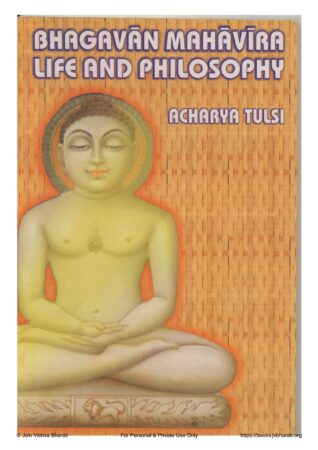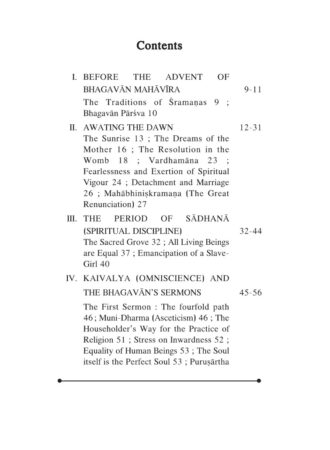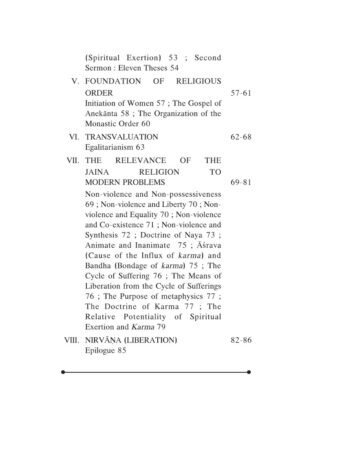
Bhagavan Mahavira: Life And Philosophy



About the Author
Acharya Tulsi was a great connoisseur of the gems of the human beings. He was a skilful sculptor. He was an artist of high caliber. He transformed many an unchiselled stones in form of human beings into excellent statues as nuns and monks. Acharya Tulsi remained in the office of Terapantha religious order for 60 years. His tenure as the Acharya was a golden period in the history of this religious order. He had the wonderful gift of adjusting himself with the changing stream of time. Acharya Tulsi, with his indomitable will power and firm determination realized every dream that he visualized. He had to face great hurdles, obstacles and strong opposition, but with his firm resolution, he overcame them all. He possessed a multidimensional personality. For the welfare of humanity, he introduced perceptional meditation, Anuvrata, science of living and training in non-violence. Acharya Mahapragya, Yuvacharya Mahashraman and Kanakprabhaji, the head of nuns, are his unique creations.
About the Book
Life is not exactly what we perceive it to be. Life is the body our soul resides. The soul is immortal i.e., which never dies. It takes rebirth numerous times. Being born in India, we all are told that someone is looking at us and keeping a check on our good deeds and bad deeds. It is said that we are born by bringing in this world the burden of deeds from our past lives be it good or bad. Hence, we were always advised by our elders and numerous great scholars to always do good deeds and practice Ahimsa which translates into non-violence. These teachings are imbibed in our minds but as time passes, we tend to overlook these teachings and focus on the results. If we fail to achieve the desired results, we feel dejected and sometimes it leads to sorrow or persistence beyond reality. Sorrow is something which is a result of our thinking. Sometimes, to achieve the desired results, we do injustice to others even without our knowledge.
This book has simply mentioned the basic principle we all must follow as human beings to live peacefully and also to free ourselves from the shackles of birth and death. In Indian Culture, we have specific uchharas which were practised but eventually, we have forgotten them. Some people relate these kinds of teachings and uchharas to spirituality and after becoming atheists and ignore it. We are from a culture where spirituality and science are always connected. For eg. In our culture, married women wear toe rings or vermilion which has a scientific reason attached to it but in the course of modernization, we think of these as age-old trends. Due to such neglect of our practices, we are facing issues but are still not ready to accept the fact that our culture is much more advanced than we think it to be. Simply practising the five basic principles of non-violence (ahimsa); non-attachment (aparigraha); not lying (satya); not stealing (asteya); and sexual restraint (brahmacharya), with these celibacy ideals one can step into a much cultured and a greed free society. Not thinking about these as a spiritual practice but thinking of them as a stepping stone to becoming a greater human being and ensuring a good environment for all. We all can at our levels start practising these basic principles and become more aware and fairer towards each other since we can easily state that,
“What goes around comes back”
Which is the case for Karma. Hence, we all should not be engulfed in temporary happiness and become unfair, rather, we all should focus on long-term happiness instead of momentary gains. The gains we earn by performing good deeds will always be with us to nullify the bad deeds which were done by us knowingly or unknowingly in the past. The one thing one must always keep in mind is that we are the determinants of our fate and by performing good deeds, we can enhance our fate. As it is said that
“Do good deeds don’t worry about the results”.
This book teaches us with examples from the Life of Tirthankara Mahavira that to live our life to the fullest, we all should be more patient and not be hostile towards anyone no matter whatever they have done to us in the past. Everyone has a different definition of living life to the fullest for some earning money and fame is living life whereas for some it is living peacefully. From this book we learn to maintain a balance between these lifestyles and incline more towards living a well-balanced lifestyle which is beneficial for others as well as for us not only on a spiritual level but also physically as well as psychologically. Lord Mahavira or Bhagwan Mahavira, or Tirthankara or Kevalgyani are the names used for addressing the Kevalgyani Mahavira, for the words Tirthankara or Kevalgyani means someone who has achieved omniscience and is free from the cycle of birth and death.
Excerpts to Remember from this book:
- The soothing message of ahimsa came as a great relief to the victims of widespread violence in the same way in the which in the first Showers of the summer rain are welcome to those sweating in the heat of the summer sun.
- It is true that new born child comes all alone and barehands in the world but it is also equally true that it subtle body and mind contains infinite potentialities.
- Joy born of a sense of worldly gains is not pure. It is alloyed with passion. Spiritual Joy is perfectly pure it can never be followed by sorrow.
- Subtle power had come to acquire perfect control over gross one. By removing the effect of Karma and enveloping his consciousness he had permanently developed the capacity for pratyaksh or direct perception, avadhi jnana which may be called as clairvoyance.
- The Principle of equalitarianism comprises dharma and it’s opposite is adharma. All the living beings are equal to each other insofar as their potentialities are concerned. No living being is smaller or greater in this respect.
- From the point of view of their development, the living beings can be classified into six categories:
- Beings with earth bodies
- Beings with water bodies
- Beings with fire bodies
- Beings with air bodies
- Vegetation being composed of vegetation bodies
- Mobile living beings.
- The following are the constituents of the Religion of Equalitarianism:
- Don’t be afraid of anybody, nor terrorise anybody.Don’t consider yourself nor others to be wretched.
- Don’t cherish hatred towards anybody.
- Don’t be sorry if you do not get what you have desired and don’t be joyous if you get it.
- Don’t be elated in your happiness and dejected in your misery.
- Don’t be attached to life nor be afraid of death.
- Don’t be puffed up by flattery nor be upset by criticism.
- Ahimsa consists in attitude of equanimity.
- Truth is the Eternal Religion. In order to practise truth—
- Don’t practise falsehood even through bodily actions.
- Be straight-forward and ingenuous by expressing the same feelings which you have in your mind.
- Speak the truth and don’t tell a lie.
- Don’t be double, tongued and maintain a balance between what you say and what you do.
- Don’t be prone to anger.
- Don’t be covetous.
- Don’t be afraid.
- Don’t indulge in revelry.
- The spirit of equality created by Bhagavan Mahavira in that age of inequality is still the greatest inspiration for the present age also.
- Unity as well as differences are the nature of things and both of them will remain. Once we develop the attitude of non-violence, differences disappear and co-existence becomes feasible. Non-violence is higher development of consciousness.
Contact Us
Feel free to post your queries, reviews and thoughts to us by writing to us at email@anadiananth.com or by filing out the form provided in the Contact Us page.
Phone No.: 8286000868
Address: 17/2 & 3, Parvati Niwas, Juhu Village, First Floor, Sector – 11, Vashi, Navi Mumbai – 400703 Above Global Pharmacy Shop Near Main Entrance Gate and Opp Shiv Sena Shaka Near Vinamra Swaraj Hospital
@Website Owned by Adv. Lalit K Jain
@ All intellectual Property Rights and Copyright of this Website is Owned by Adv. Lalit K Jain